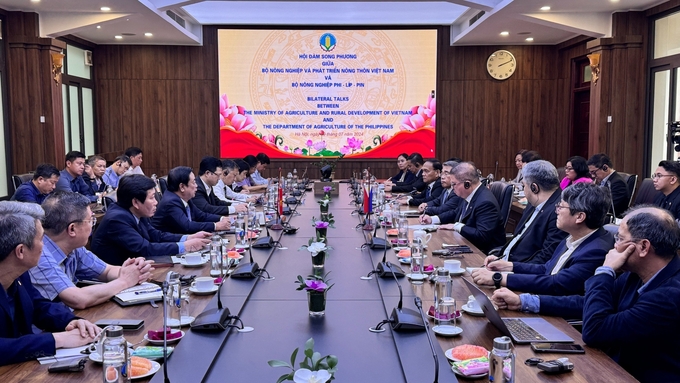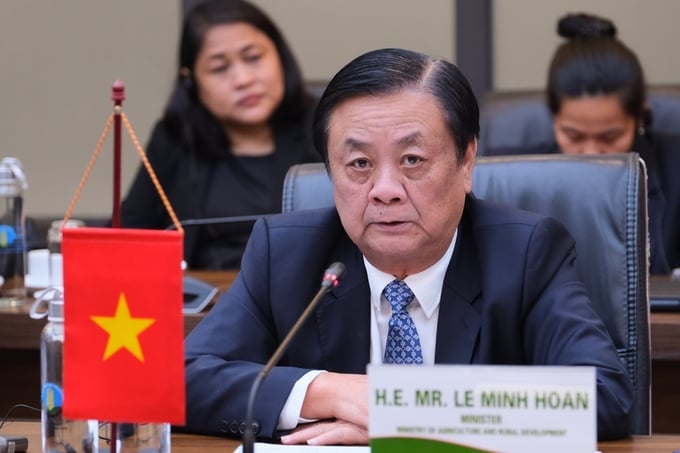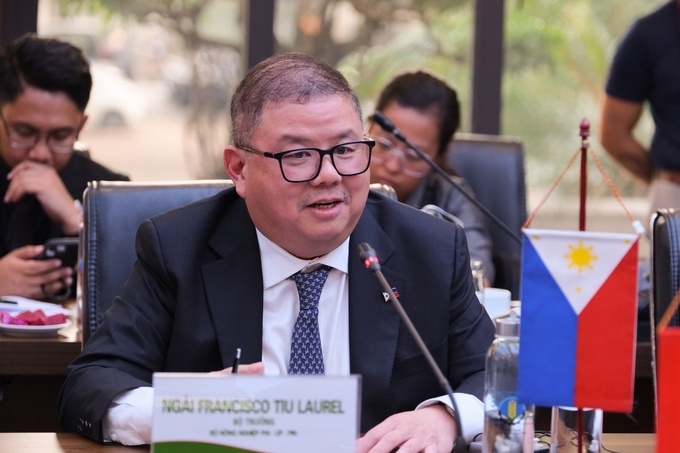May 21, 2025 | 13:24 GMT +7
May 21, 2025 | 13:24 GMT +7
Hotline: 0913.378.918
May 21, 2025 | 13:24 GMT +7
Hotline: 0913.378.918

The meeting between the Ministry of Agriculture and Rural Development and the Philippine Ministry of Agriculture on July 9. Photo: Quynh Chi.
On the afternoon of July 9, at the Ministry of Agriculture and Rural Development, Minister Le Minh Hoan met and worked with Mr. Francisco Tiu Laurel Jr., Minister of Agriculture of the Philippines.
In the current context of global market fluctuations, changing consumer preferences, and increasingly evident climate change, Vietnam's rice industry is undergoing a significant transformation in both production and export, as well as domestic consumption and export strategies.
Vietnam is focusing on improving the quality of its rice industry, reducing input costs, adapting to climate change, lowering greenhouse gas emissions, ensuring national food security, and expanding consumer markets. The goal is to build a sustainable rice brand in the international market.
Minister Le Minh Hoan remarked, "Rice production plays a pivotal role in ensuring national food security, contributing to economic development, social stability, and enhancing Vietnam's international standing. Our rice industry benefits from favorable ecological conditions tied to the cultural values and heritage of our ancient wet rice civilization."
With new cooperation potentials, Minister Le Minh Hoan hopes the two countries will soon transition from trade relations to investment partnerships in the rice industry. This will enable Vietnam to introduce appropriate technologies to optimize the Philippines' rice production chain, instead of merely exporting milled rice products.
Additionally, the two Ministries of Agriculture can explore the possibility of joint venture rice production to ensure regional food security.

Minister of Agriculture and Rural Development Le Minh Hoan hopes that the two ministries will upgrade their relationship to an investment partnership in the rice industry, thereby facilitating trade in technology and production materials. Photo: Quynh Chi.
Responding to the leaders of the Ministry of Agriculture and Rural Development, Minister Francisco Tiu Laurel Jr. expressed his admiration for Vietnam's rice production sector. Last week, a delegation from the Philippine Ministry of Agriculture visited the Mekong Delta to observe a 1-million-hectare model of high-quality, low-emission rice and a circular agricultural economy model.
Accordingly, the Philippine agricultural leader considered the talks with the Ministry of Agriculture and Rural Development an important opportunity to promote bilateral cooperation in the fields of agriculture, food security, and sustainable development, as well as to enhance agricultural trade and connect businesses from both countries.
“For us, this business trip is a practical classroom. We can exchange experiences first hand with farmers and businesses in the Mekong Delta. These are very valuable experiences, giving us more ideas to promote Philippine agriculture," Minister Laurel Jr affirmed.
Currently, the Philippine agriculture and fishery industry faces significant challenges due to low productivity and mostly small-scale production activities. Recent political, social, and environmental changes have also exerted considerable pressure on the Philippines' food production and distribution system, directly affecting food security and nutrition in the country.
Therefore, Mr. Laurel Jr highly appreciates Vietnam's sustainable farming orientation, which combines mechanization with the goal of reducing the use of pesticides and fertilizers. The Philippine minister stated, "This method is simple but highly economical. Thanks to this approach, our country's farmers save significantly on material costs."

The Philippine Minister of Agriculture considers his visit to Vietnam a valuable learning experience. Photo: Quynh Chi.
In the future, the Philippines plans to explore opportunities to import machinery and materials, and to localize Vietnamese technologies for application in their rice production industry.
Minister Laurel Jr shared more about Vietnam's Sustainable Agriculture and Rural Development Strategy to 2030, with a vision to 2045, which is built on three pillars: "ecological agriculture, modern rural areas, and civilized farmers."
“With the new Strategy, we aim for a green agricultural value chain, low-emission agriculture, improving the capacity of cooperatives, and enhancing the capacity of rural communities by improving rural infrastructure to cope with climate change. Additionally, we aim to link the value chain between businesses and farmer organizations," Minister Hoan informed.
Beyond the rice industry, leaders from the Ministry of Agriculture and Rural Development suggested that both sides continue to promote cooperation in the fisheries sector, based on the Memorandum of Understanding between the two Governments on fisheries cooperation.
Vietnam is keen to learn from the Philippines to increase the exploitation of tuna raw materials for Vietnam's tuna processing factories, develop seaweed farming, and collaborate in the cultivation and processing of seaweed.
According to the Philippine Department of Crop Production, in the first six months of 2024, the country’s rice imports reached 2.17 million tons. Vietnam is the largest rice supplier to the Philippines, providing 1.59 million tons.
Translated by Quynh Chi

(VAN) In 2024, over 295 million people across 53 countries and territories faced acute hunger—an increase of almost 14 million people compared to 2023, while the number of people facing catastrophic levels of hunger reached a record high.

(VAN) World Environment Day 2025 (June 5) carries the theme 'Beat Plastic Pollution' continuing to emphasize the global urgency of addressing the plastic waste crisis.

(VAN) This was the assessment shared by experts at the workshop titled 'Assessing the Role and Potential of Low-Emission Rice Production Systems in Vietnam,' held on the morning of May 19.

(VAN) Cai Rong Port is the fisheries control center of Quang Ninh, helping to monitor fishing vessels, combat IUU fishing, and remove the EC's 'yellow card'.

(VAN) The German Agricultural Society (DLG) explores the possibility of establishing a mechanization service center in Vietnam’s Mekong Delta to support farmers in accessing and utilizing advanced machinery.

(VAN) On May 16, the Department of Water Resources Management, in collaboration with the Food and Agriculture Organization of the United Nations (FAO), held a signing ceremony for the GEF-8 project document.

(VAN) Food safety, mechanization, vocational training, and market opening are key areas of cooperation expected between the Vietnamese Government and the Federal Republic of Germany.